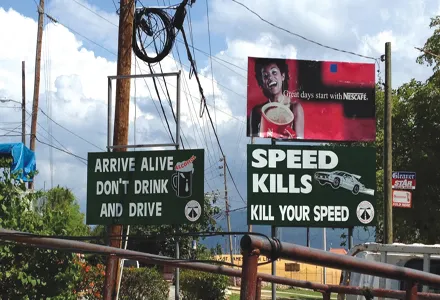
Safer Roads by Design - Costa Rica was hosted by the National Laboratory of Materials and Structural Models of the University of Costa Rica (Lanamme UCR), the country’s leading knowledge centre on road engineering, with additional support from the
Delegates from eight countries representing a cross-section of Latin American road safety agencies, manufacturers, engineering consultancies and academia took part in this event, providing a fertile ground for a regional exchange of perspectives among road safety stakeholders.
In many ways, Costa Rica is at a turning point. In 2011, fatalities stood at 607, down from a high of 750 in 2008, but with an over-representation of two-wheelers and pedestrians.
Pedestrian alone make up a third of total road traffic injuries, a much higher figure than is generally prevalent in the region, while cycling remains a popular commuting option.
"The Organisation of American States is proud of its partnership with the IRF given the critical importance of creating well-trained human resources in the important area of roads and highways. The seminar "Safer Roads by Design" addresses the fundamental issue of safety on the roads, a necessary and non-negotiable condition for the socio-economic development of the region in a globalised world and to continue the mandate of the Summit of the Americas in terms of the physical connectivity of the hemisphere"
Jorge Duran
Head of Technology and Innovation
Organisation of American States
In 2009, an inspection carried out by the International Road Assessment Program (iRAP) reviewed 2,801km of roads, approximately 64% of Costa Rica’s paved national highways, including Pan American Highway (Routes 1 and 2) from Nicaragua to Panama.
The assessment identified key countermeasures with the potential to reduce deaths and injuries involving vulnerable road users, including footpaths separated from or adjacent to the roadway, new pedestrian crossings, and sealed shoulders offering a hard surface for pedestrians and bicyclists outside the travel lanes.
The resulting programme was estimated by iRAP to save 1,300 lives and prevent 13,000 serious injuries over a 20-year period, equivalent to an 11% reduction in Costa Rica’s annual highway fatalities, for an initial expenditure of US$50 million.
Best practices in safe road engineering presented on this occasion come as Lanamme UCR has begun field-testing a roadside safety design manual in an effort to encourage the country’s road engineers to identify hazards before these translate into serious injury and death for road users.
In line with IRF’s own recommendations, the guide discourages the use of “fishtails” ends in favour of crashworthy terminals.
However, funding safer road engineering remains a challenge: crash cushions hit by errant vehicles are sometimes left without repair for a year or more.
Feedback from delegates and the host organisation was extremely encouraging and plans are already afoot for a new IRF seminar in the region.
IRF expresses its gratitude for the industry partners which made the event possible: Trinity Highway Products International,
The most comprehensive IRF road safety training Seminar ever offered
IRF’s “Road Safety Across Six Continents” seminar is one of the most comprehensive road safety training programmes in the world. Experts from a variety of countries will present best practices and state of the art technologies. Over a 10 day period, the purpose of this training programme is to help road authorities understand what can be done to help them meet their Decade of Action commitment to reduce fatalities by 50% by 2020. The training program will focus on five main topics to include: Roadside Safety, Work Zone Safety, Vulnerable User Safety, Traffic Management and Road Safety Audits.






